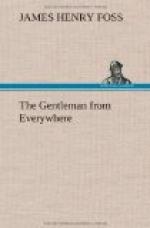If my foresight had been half so good as my hindsight, I would never have left W——, but the tempter came in the form of an offer of a much larger salary from N——, and I foolishly accepted.
The change from W—to N——, was like that from breezy, sunny green fields, where wild birds sang their free, joyous songs, and where wild flowers bloomed free as air exhaling their sweet perfumes, to the suffocating air of a hothouse where the birds drooped in cages and where the few flowers were forced into existence by steam heat and unsavory fertilizers. In the former the people were social, natural and free from the trammels of tyrannical fashions; in the latter they were cold, distant, and valued you according to the size of your bank account and the number of your horses and servants. In the one the teachers were educators, free to develop superior methods along their own original lines; in the other they were mere machines to carry out the ironclad rules of the opinionated precedent-hunting school board.
In the former all seemed like one great family sympathizing and loving; in the latter the newly-rich set the pace of ignoble luxury and display; while the others aped their ways which led many to bankruptcy, poverty, and misery. In the one you were free from all social ostracism if you worshipped according to the dictates of your own conscience; in the other you were ignored and disliked unless you attended and contributed liberally for the support of the palatial orthodox church.
I was early told that I would fail if I persisted in attending the little Unitarian church; but I preferred failure to hypocrisy, and would not sell my birthright of conscience for a mess of pottage. Two of my ancient, sour-faced assistants were bigoted members of the fashionable church, and at once set me down as a corruptor of youth because I was an advocate of the liberal faith. The venomous spite of one of these forcibly suggested the spirit of the inquisition, and one day she found her blackboard decorated with the following truthful poem, suggested by her spirit and the first syllable of her name:
“Old Aunt Dunk
Is a mean old skunk.”
She flew into a furious rage, declared that some Unitarian must have perpetrated this insult, and that I must find the culprit.
She never forgave me because I failed to do so, and at her urgent solicitation the minister, after great exertion, secured a few signatures to a petition for my discharge on the plea that I chewed tobacco and expectorated on the floor in the presence of my class. As I easily proved that I never chewed tobacco, and as my patrons presented an overwhelming protest, the prayer of the petitioners was unanimously refused by the school board.
It would have been laughable had it not been so serious and pitiful, to see the frantic attempts of the poor in this town to keep up appearances, and counterfeit the style of those who had grown rich by cheating widows and orphans in bucket shops and stock gambling. The little minnows put on all the snobbish airs of the whales who had grown so large by devouring all the small fish in their business seas.




